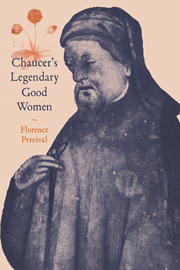15 - The Legend as courtly game
Published online by Cambridge University Press: 22 October 2009
Summary
The early fifteenth-century literary society known as Charles VI's cour amoureuse was formed on St Valentine's Day, 1400, ‘à l'onneur, loenge et recommendacion de toutes dames et damoiselles’. Its members were strictly forbidden to compose ‘ditties, complaints, rondeaux, virelais, ballades, lays [or] any other literary form, in rhyme or prose, to the dishonour, blame, disparagement or detraction of any lady or ladies, damsel or damsels, or of women as a whole, whether living or dead, for any cause whatsoever, such as may give serious and unpleasant offence’. The penalties for disobeying were severe, although probably tongue-in-cheek, yet one imagines that such strictures only came into existence because the likelihood of their not being conformed to was a very real possibility. This pastime, la louange des dames, the praise of women, operated at one pole of the literary treatment of the ‘matter of Woman’. It was in diametrical opposition to the strategies of clerical antifeminism with its store of jokes and exempla against women and its appeals to ‘experience’. In the opening lines of the Legend of Good Women Chaucer contrasts faith in the verities of religion with the urgent questioning of experience, and this epistemological dilemma of the ordinary Christian is replicated playfully in the poet's response to the ‘woman question’.
- Type
- Chapter
- Information
- Chaucer's Legendary Good Women , pp. 299 - 324Publisher: Cambridge University PressPrint publication year: 1998



